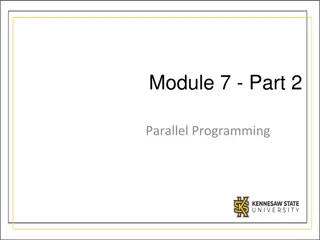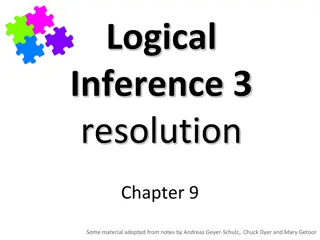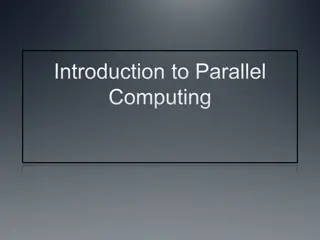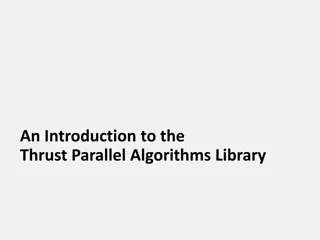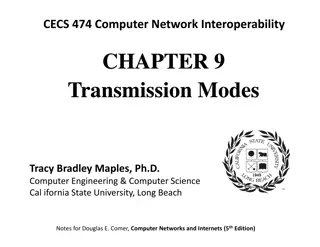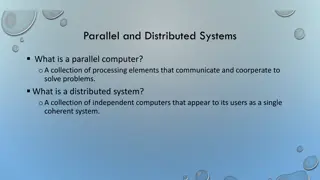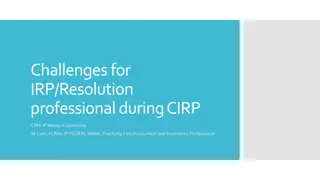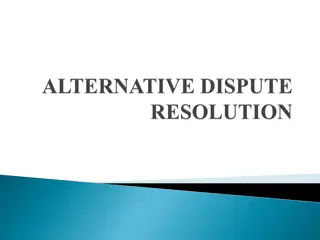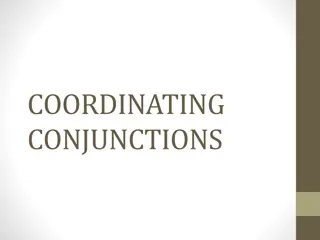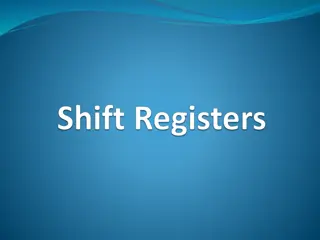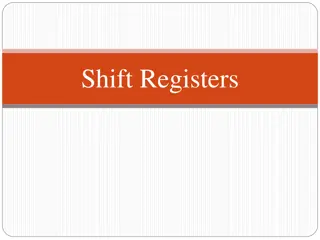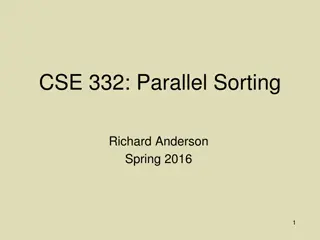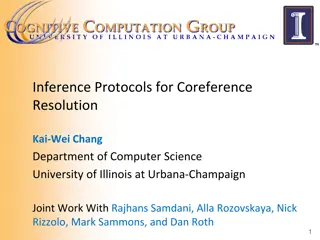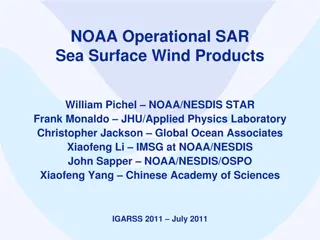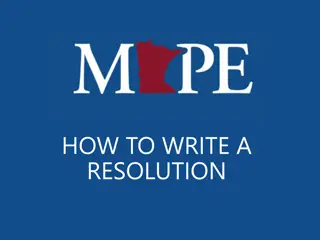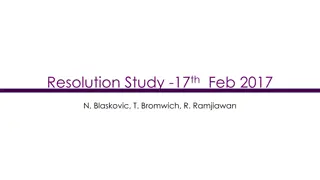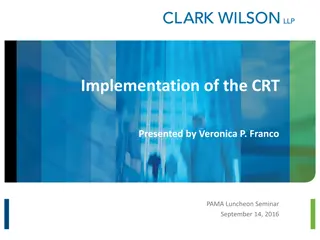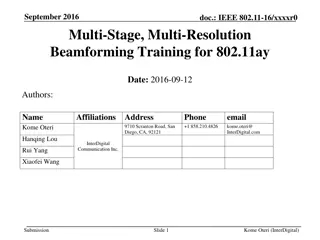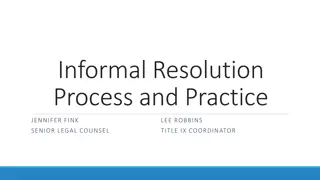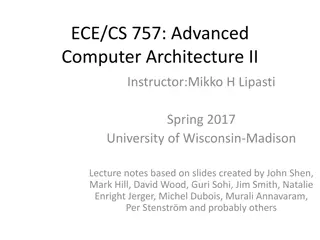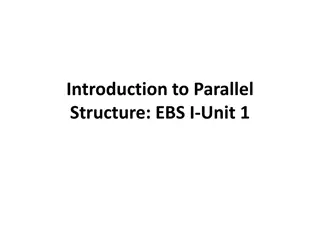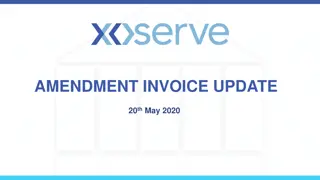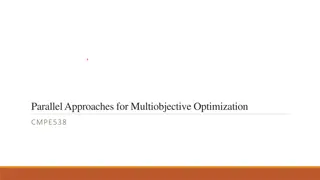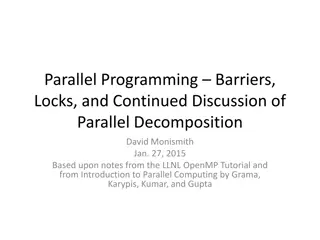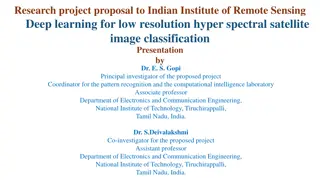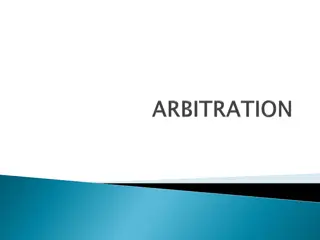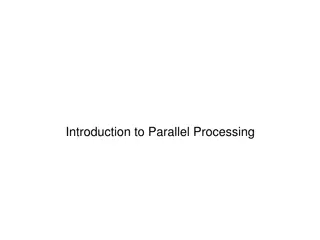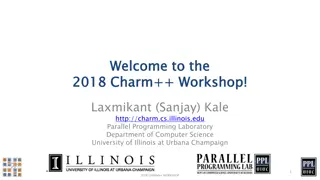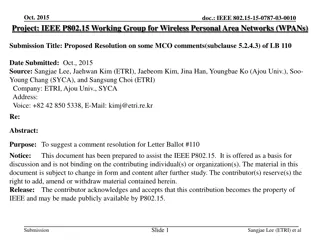Progressive Approach to Relational Entity Resolution
In this research paper authored by Yasser Altowim, Dmitri Kalashnikov, and Sharad Mehrotra, a progressive approach to relational entity resolution is presented. The study focuses on balancing cost and quality in entity resolution tasks for relational datasets. The goal is to develop a method that ac
1 views • 20 slides
Evolution of Parallel Programming in Computing
Moores Law predicted the doubling of transistor capacity every two years, benefitting software developers initially. However, hardware advancements can no longer ensure consistent performance gains. Parallel computing, leveraging multicore architecture, has emerged as a solution to optimize performa
7 views • 10 slides
Understanding 4-Bit Parallel Adder/Subtractor IC7483
Explore the concept of 4-bit parallel adder/subtractor using IC7483, which is a digital circuit capable of performing arithmetic operations on binary numbers greater than one bit in length. Learn about the structure, operation, and implementation of parallel adders with cascaded full adders. Discove
8 views • 11 slides
Understanding Resolution in Logical Inference
Resolution is a crucial inference procedure in first-order logic, allowing for sound and complete reasoning in handling propositional logic, common normal forms for knowledge bases, resolution in first-order logic, proof trees, and refutation. Key concepts include deriving resolvents, detecting cont
2 views • 12 slides
Exploring Parallel Computing: Concepts and Applications
Dive into the world of parallel computing with an engaging analogy of picking apples, relating different types of parallelism. Learn about task and data decomposition, software models, hardware architectures, and challenges in utilizing parallelism. Discover the potential of completing multiple part
0 views • 27 slides
Understanding Parallel and Distributed Computing Systems
In parallel computing, processing elements collaborate to solve problems, while distributed systems appear as a single coherent system to users, made up of independent computers. Contemporary computing systems like mobile devices, IoT devices, and high-end gaming computers incorporate parallel and d
1 views • 11 slides
Introduction to Thrust Parallel Algorithms Library
Thrust is a high-level parallel algorithms library, providing a performance-portable abstraction layer for programming with CUDA. It offers ease of use, distributed with the CUDA Toolkit, and features like host_vector, device_vector, algorithm selection, and memory management. With a large set of al
0 views • 18 slides
Understanding Transmission Modes in Computer Networks
Transmission modes in computer networks can be divided into serial and parallel modes. Parallel transmission allows multiple bits to be sent simultaneously over separate media, while serial transmission sends one bit at a time. The choice between serial and parallel transmission depends on factors s
0 views • 13 slides
Parallel Implementation of Multivariate Empirical Mode Decomposition on GPU
Empirical Mode Decomposition (EMD) is a signal processing technique used for separating different oscillation modes in a time series signal. This paper explores the parallel implementation of Multivariate Empirical Mode Decomposition (MEMD) on GPU, discussing numerical steps, implementation details,
1 views • 15 slides
Understanding Parallel and Distributed Systems in Computing
A parallel computer is a collection of processing elements that collaborate to solve problems, while a distributed system comprises independent computers appearing as a single system. Contemporary computing systems, like mobile devices and cloud platforms, utilize parallel and distributed architectu
0 views • 11 slides
Challenges Faced by Insolvency Resolution Professionals during Corporate Insolvency Resolution Process
Insolvency Resolution Professionals encounter various challenges during the Corporate Insolvency Resolution Process, such as the need for prompt public announcements, appointing valuers, handling difficult transactions like preferential deals and related party transactions, assessing fraudulent acti
0 views • 8 slides
Innovative Dispute Resolution Mechanisms: ADR in India
The concept of settling disputes through Alternative Dispute Resolution (ADR) in India introduces non-adversarial mechanisms for resolving legal suits between parties. ADR encompasses negotiation, mediation, arbitration, conciliation, and case evaluation, offering a more collaborative approach to co
0 views • 16 slides
Understanding Coordinating Conjunctions and Parallel Structure
Coordinating conjunctions like "and," "but," "or," and "nor" are used to connect words or phrases with similar grammatical functions. This creates parallel structure in sentences, ensuring clarity and cohesion. Using examples, the concept of parallel structure with coordinating conjunctions is expla
0 views • 19 slides
Effectiveness of Conflict Resolution Education in Schools
Conflict resolution education plays a crucial role in transforming school environments by reducing violence and promoting win-win outcomes. Various successful programs have shown significant improvements in school settings, such as reduced suspensions and conflicts among students. Conflict resolutio
9 views • 6 slides
Recent Developments on Super-Resolution: A Comprehensive Overview
Super-resolution technology aims to reconstruct high-resolution images from low-resolution inputs, with applications in video surveillance, medical diagnosis, and remote sensing. Various convolutional neural network (CNN) models have been developed, such as SRCNN, VDSR, ESPCN, and FSRCNN, each with
0 views • 12 slides
Understanding Shift Registers: Introduction and Classification
Explore the world of shift registers, including buffer registers, and different modes of operation like serial in/serial out, serial in/parallel out, parallel in/serial out, and parallel in/parallel out. Learn about the construction, operation, and classification of registers in digital systems.
1 views • 24 slides
Understanding Shift Registers in Sequential Logic Circuits
Shift registers are sequential logic circuits used for storing digital data. They consist of interconnected flip-flops that shift data in a controlled manner. This article explores different types of shift registers such as Serial In - Serial Out, Serial In - Parallel Out, Parallel In - Serial Out,
2 views • 9 slides
Advancing Charged Particle Tracking Resolution in Particle Physics
Exploring the measurement of angle, curvature, and accuracy in charged particle tracking resolution within the CLAS Collaboration. The discussion delves into momentum resolution goals, ideal B-field alignment, and achieving 0.3% accuracy. Details on current momentum resolution, necessary steps for i
0 views • 19 slides
Understanding Parallel Circuits in Electronics
Explore topics such as resistors in parallel, voltage distribution, Kirchhoff's current law, resistance calculations, and practical applications in parallel circuits. Dive into problem-solving exercises and grasp concepts like current dividers, total resistance calculations, and power distribution i
0 views • 20 slides
Enhancing Internet Backbone Performance through Parallel Resolution of Packets and Rules
The bottleneck in Internet backbones lies in the decision-making process for incoming packets. This article explores the challenges faced in efficiently processing policies in routers and middleboxes by introducing parallel resolution techniques to increase throughput and reduce latency. It discusse
0 views • 22 slides
Understanding Parallel Sorting Algorithms and Amdahl's Law
Exploring the concepts of parallel sorting algorithms, analyzing parallel programs, divide and conquer algorithms, parallel speed-up, estimating running time on multiple processors, and understanding Amdahl's Law in parallel computing. The content covers key measures of run-time, divide and conquer
1 views • 40 slides
Coreference Resolution System Architecture and Inference Methods
This research focuses on coreference resolution within the OntoNotes-4.0 dataset, utilizing inference methods such as Best-Link and All-Link strategies. The study investigates the contributions of these methods and the impact of constraints on coreference resolution. Mention detection and system arc
0 views • 18 slides
NOAA SAR High-Resolution Coastal Winds Overview
NOAA's Operational SAR Sea Surface Wind Products provide detailed information on wind patterns derived from SAR images. The system aims to implement high-resolution wind production, capable of deriving winds from various SAR satellites. The operational goals include compatibility with international
0 views • 28 slides
Guide to Writing a Resolution for Democratic Improvement
A resolution is a formal request to change constitutions, election rules, policies, or bylaws, considered by the Delegate Assembly as a democratic way to enhance a union. Locals, statewide committees, Board of Directors, and any two or more members can submit resolutions. Resolution writers have the
0 views • 33 slides
Analysis of Resolution Study and Charge Scans on 17th Feb 2017
Detailed analysis conducted on 17th Feb 2017 includes resolution calculations, charge scans, attenuation comparisons, and improvements in data fitting. The study compares measured resolutions with predicted scaling, examines the impact of additional information on fitting, and explores peak shifts i
0 views • 30 slides
Understanding the Civil Resolution Tribunal (CRT)
Civil Resolution Tribunal (CRT) is introduced as a place to resolve strata-related disputes in an accessible, speedy, and economical manner. It aims to encourage agreement between parties or decide claims. CRT's mandate includes providing fair dispute resolution services using electronic tools. The
0 views • 38 slides
Multi-Stage, Multi-Resolution Beamforming Training for IEEE 802.11ay
In September 2016, a proposal was introduced to enhance the beamforming training procedures in IEEE 802.11ay for increased efficiency and MIMO support. The proposal suggests a multi-stage, multi-resolution beamforming training framework to improve efficiency in scenarios with high-resolution beams a
0 views • 11 slides
Parallel Programming Directives and Concepts
Learn about parallel programming directives like Diretiva.parallel and #pragma omp.parallel, which allow code to be executed by multiple threads simultaneously. Explore concepts such as defining parallel regions, setting the number of threads, and utilizing OpenMP directives for parallel for loops.
0 views • 39 slides
Understanding Informal Resolution Process and Practice in Grievance Procedures
Exploring the process of informal resolution in grievance procedures, focusing on mediation, confidentiality, impartiality, and neutrality. Parties can voluntarily engage in informal resolution before a formal determination, with specific requirements and timeframes outlined. Mediation fosters self-
0 views • 9 slides
Understanding Parallel Software in Advanced Computer Architecture II
Exploring the challenges of parallel software, the lecture delves into identifying and expressing parallelism, utilizing parallel hardware effectively, and debugging parallel algorithms. It discusses functional parallelism, automatic extraction of parallelism, and finding parallelism in various appl
0 views • 86 slides
Mastering Parallel Structure in Business Communication
Understanding and implementing parallel structure in business communication is essential for clear, effective, and professional writing. Explore the nuances of parallelism, such as using correlative conjunctions like "not only...but also," to ensure consistency and coherence in your written work. Le
0 views • 21 slides
Amendment Invoice Update Summary and Resolution Plan
Unique MPRNs with ASP mismatch issues were addressed, avoiding customer updates this month. An improved extraction process led to early file delivery and resolution steps cataloging was completed. Automation of exception resolution is in progress. Defect resolution was impacted by prioritization and
0 views • 10 slides
Understanding Spatial Resolution in Astronomical Imaging
This lecture delves into the requirements for resolution and sensitivity in astronomical imaging, exploring factors such as spatial resolution, optical design aberrations, and noise sources. It explains how spatial resolution is crucial in distinguishing objects, discussing the Rayleigh criterion an
0 views • 45 slides
Parallel Approaches for Multiobjective Optimization in CMPE538
This lecture provides a comprehensive overview of parallel approaches for multiobjective optimization in CMPE538. It discusses the design and implementation aspects of algorithms on various parallel and distributed architectures. Multiobjective optimization problems, often NP-hard and time-consuming
0 views • 20 slides
Understanding OpenMP Barriers and Locks in Parallel Programming
Exploring the concepts of OpenMP barriers and locks in parallel programming, this discussion covers the importance of synchronization through barriers, the use of lock variables for finer control over synchronization, and examples like the Dining Philosophers problem. Learn how these primitives faci
0 views • 22 slides
Deep Learning for Low-Resolution Hyperspectral Satellite Image Classification
Dr. E. S. Gopi and Dr. S. Deivalakshmi propose a project at the Indian Institute of Remote Sensing to use Generative Adversarial Networks (GAN) for converting low-resolution hyperspectral images into high-resolution ones and developing a classifier for pixel-wise classification. The aim is to achiev
0 views • 25 slides
The essence of Arbitration: A Private Dispute Resolution Mechanism
Arbitration is a dispute resolution method where parties agree to have a neutral third party make a binding decision. It offers privacy, flexibility, and control over the process, allowing for a fair resolution without unnecessary delay. The process is initiated by mutual consent, and the parties ca
0 views • 79 slides
Understanding Parallel Processing Fundamentals
This overview delves into the basics of parallel computing, covering parallel memory architectures, programming models, design issues, and parallelizing serial programs. Parallel computing involves leveraging multiple compute resources simultaneously to enhance computational efficiency and solve pro
0 views • 35 slides
Introduction to Charm++ Programming Framework
Charm++ is a generalized approach to parallel programming that offers an alternative to traditional parallel programming languages like MPI, UPC, and GA. It emphasizes overdecomposition, migratability, and asynchrony to enhance parallel program performance and efficiency. The framework uses indexed
0 views • 43 slides
Proposed Resolution on MCO Comments in IEEE P802.15 Working Group Document
The document presents a proposed resolution for comments on some clauses in the IEEE P802.15 Working Group document submitted in October 2015. The resolution addresses discrepancies and suggests revisions related to the transmission and scheduling of TC IE frames in wireless personal area networks.
0 views • 20 slides

